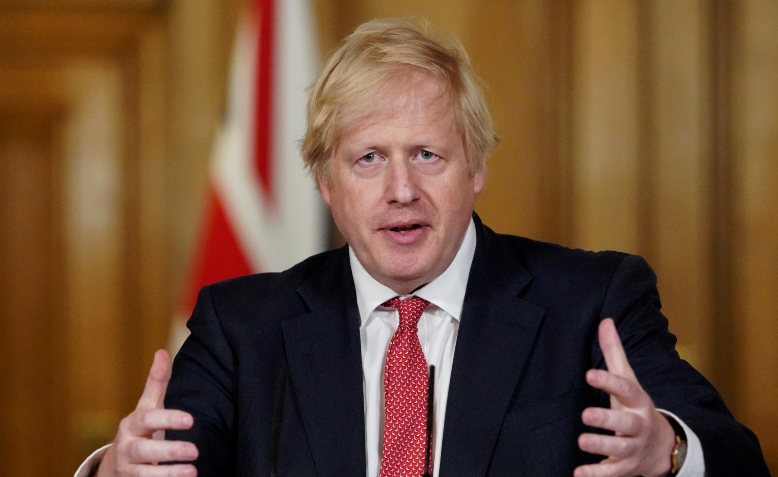 Boris Johnson briefing 11 May. Photo: Flickr/Number10
Boris Johnson briefing 11 May. Photo: Flickr/Number10
The Tories are talking about more austerity and we need to shut it down, argues Kevin Potter
Boris Johnson took office pledging that he would end austerity (something Theresa May had already claimed to have done). In many ways we have reason to believe that he did actually intend to open the government cheque book. His election pledges included: roll out of superfast broadband, six new hospitals (discounting the non-existent ones he made up during the election), £20bn for day-to-day NHS spending, 50,000 new nurses and additional (if paltry) money for schools among other spending pledges.
This is not to say their pledges came anything close to overturning the devastation of a decade of Tory austerity and they certainly weren’t offering anything to redress the UK’s grotesque inequalities in wealth and power. But, cynical and untrustworthy as Johnson is, the shift in rhetoric did signal that even the Conservatives had come to accept that austerity was unpopular and discredited and that a change of course was needed to avoid electoral disaster.
The pandemic
Then came the coronavirus. It immediately exposed the Tories’ true colours as we saw when their first instincts were to protect profits, at the expense of lives, with their herd immunity ‘strategy’. The public didn’t fall for it and Johnson was forced to backtrack and take measures to declare the lockdown, in effect freezing the economy.
Worse still from a Tory perspective is that – faced with the prospect of mass unemployment, collapse of the small business sector and a tidal wave of evictions and homelessness – they were forced to support wages through the furlough scheme and other state aid measures. The predicted cost is likely to be in the region of £300 billion. Yet, despite these and similar measures being taken by countries around the world, a severe global recession is unavoidable.
The question, as in every crisis, is how will we get out of it and who will pay? The response to the 2008 banking crash was the transfer of private debt onto the public balance sheet, which was then used as a foil to impose an ideological attack on what was left of the welfare state through austerity.
Profits were partially restored. The fortunes of the rich grew while the majority were made to suffer falling wages and declining living standards. Meanwhile, government borrowing continued to soar and demand in the real economy shrank as people were impoverished. In short, as was known from the outset, you cannot cut your way to economic prosperity.
Yet, despite this being a matter of recent history, being exposed as a con, being hated by the public and being demonstrably a complete failure even on its own terms, it seems that sections of the British establishment are keen to impose another round of austerity. A treasury document drawn up for Chancellor Rishi Sunak was reported in a recent Times article. Incredibly it looks to further cuts, while talking of ending the pension triple lock, introducing public sector pay freezes and hiking up income tax and VAT.
Sheer cruelty aside, this is nothing short of insanity.
What’s next?
The coming recession will almost certainly be characterised by a collapse in demand as people lose jobs and income. Discretionary spending will fall away affecting retail, tourism, entertainment, from which even investors will not be shielded.
Yet here we have the civil service proposing cuts that will compound the situation. Proposing the same, intellectually bankrupt, supply side measures that have failed so catastrophically in the last decade and in circumstances where there is nothing left to cut. We must defeat any renewed efforts to impose austerity.
The only route out of the coming recession, even on capitalist terms, will require investment. Investment in good, green, jobs, in housing, in infrastructure, in welfare and health.
Capitalism relies on consumption, but people with nothing cannot consume. Yet, rather than invest, it seems some in the Treasury believe a second squeeze of the stone will miraculously yield blood. The good news is that the lies and incoherence of the austerity argument are now laid bare. There is no public appetite for it and no agreement within the ranks of capital.
For the left there remains an opportunity to build a better world out of the wreckage of the crisis – to ensure that neoliberal ‘normality’ does not return. Our immediate task remains to defend lives in the face of a callous and incompetent government. But looking ahead it seems possible that we may have to face down the ghost: the dangerous idea that is austerity.
Fund the fightback
We urgently need stronger socialist organisation to push for the widest possible resistance and put the case for change. Please donate generously to this year’s Counterfire appeal and help us meet our £25,000 target as fast as possible.

